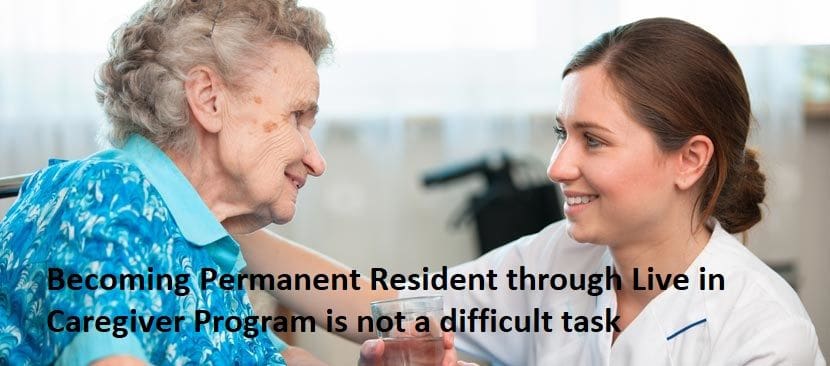Becoming Permanent Resident through Live in Caregiver Program
What is the Live-In Caregiver Program
The Live-in Caregiver Program (LCP) is designed to enable Canadians to recruit foreign nationals to provide childcare or home support for seniors or people with disabilities. Individuals with twenty-four months of work experience on a LCP work permit could apply to transition to permanent residence. The Live-in Caregiver Program is mutually beneficial for both the Canadian employer and the live-in care giver, as the employer gets the services from the foreign national, and the foreign national can obtain employment and/ or achieve permanent residency in Canada. If you think you might be eligible to be a live-in caregiver, or you might need to hire a foreign live-in caregiver, then continue to read this blog for more information.
What is a Live-In Caregiver
A live in caregiver is provides care for children or people with high medical needs. Usually, the live-in caregiver lives with the employer to take care of the children or the patient(s). To begin, the live-in caregiver will enter Canada as a temporary foreign worker.
If you want to be a Live-In Caregiver, you must meet many requirements to be eligible for the live-in caregiver program:
- You must have completed 24 months of authorized full-time (at least 30 hours of paid work per week) employment as a live-in caregiver within four years from the date you entered Canada under the Live-in Caregiver Program
- You must have completed a total of 3,900 hours (within a minimum of 22 months which may include a maximum of 390 hours of overtime) of authorized full-time employment as a live-in caregiver within four years from the date you entered Canada under the Live-in Caregiver Program.
Please note, when you are calculating your work experience, you cannot include any period of unemployment, any extended time outside Canada, any period you work for your employer outside Canada, and any period you work in Canada as a caregiver while living outside the home of your employer.
What factors can Affect Your Application
If you, your spouse, common-law partner, or any of your family members have inadmissibility, your application will most likely be refused. If you also misrepresent information on your application, your application will be refused. Please note, the Immigration, Refugees and Citizenship Canada takes misrepresentation very seriously, and as such, you can be prohibited from future applications or even denied entry to Canada.
On the other hand, there are some factors that will not affect the result of your application. For example, upgrading your skills in Canada, volunteer work, marital status, or the number of family members you have in your home country.
Submitting the Application for Permanent Residence
There are a variety of other things which must be included in an individual’s application for permanent residence under the live-in caregiver program. Apart from your eligibility for the program, the immigration officer will ensure you have entered Canada on completely truthful grounds. At the same time, the immigration officer will assess the spouse, common-law partner, conjugal partner, and dependants the principal applicant has to ensure no one is criminally or medically inadmissible to Canada. If you fail to declare any dependants or family members on the initial application, you will likely be accused of misrepresentation, and this may result in the refusal of your application.
What if I need to Leave Canada during the Application Process
If you want to leave Canada while your permanent residence application is being processed, you will need to obtain a temporary resident visa before returning to Canada. This is an important application for you to consider before you leave Canada, because it gives you the authorization to come back to Canada
If you are not present in Canada for more than one year, or if your work permit has expired, you will have to reapply to the overseas visa office or Visa Application Centre to return to Canada.
If you wish to leave Canada permanently and return to your home country, you have the right leave the Live-in Caregiver Program at any time. You should give adequate notice to your employer out of courtesy, though.
Confirmation of permanent residence
If the Immigration, Refugees and Citizenship Canada approves your application, you will get a permanent resident visa. You will also receive Confirmation of Permanent Residence (COPR), along with your visa. If you are from a non-visa exempt country, you will also get an entry visa.
Your Confirmation of Permanent Residence (COPR) will have information about who you are as well as your photograph. It is your responsibility to make sure all information on the confirmation is correct. The information should be in accordance with your passport information.
Upon your arrival, you must make sure you have your Confirmation of Permanent Residence (COPR) and, if applicable, your visa.
Contact Akrami and Associates
Akrami and Associates have dealt with hundreds of Live in Caregiver Application cases. We have helped our clients in their difficult situations and have guided them to draft a more effective application. We can help you draft your application and arrange the required documents. A well-planned and complete application will increase your likelihood of acceptance and will save your from hassle. Please feel free to contact Akrami & Associates at 416-477-2545 for more information or if you would like to book a consultation with an immigration professional for more advise.
With Akrami and Associates, there is always a way!
Latest Immigrations News

December 5, 2025
THE ULTIMATE GUIDE TO HUMANITARIAN & COMPASSIONATE (H&C) APPLICATIONS IN CANADA
THE ULTIMATE GUIDE TO HUMANITARIAN & COMPASSIONATE (H&C) APPLICATIONS IN CANADA Understanding When, Why, and How to Apply for Permanent Residence on Humanitarian Grounds What Is an H&C Application? A Humanitarian and Compassionate (H&C) application is a last-resort pathway for individuals who are in Canada and do not [...]

September 11, 2025
Canada Super Visa: Step-by-Step Guide for Parents and Grandparents
For many Canadian citizens and permanent residents, bringing parents or grandparents to Canada for extended visits is more than just a wish, it’s a heartfelt need. While most people first consider the traditional visitor visa, there is another option designed specifically for family reunification: Super Visa applications. [...]

August 23, 2025
Intra-Company Transfer (ICT) Work Permit, Your Complete Guide to Working in Canada
For multinational companies, moving key talent across borders is often essential for growth and operational success. The Intra-Company Transfer (ICT) Work Permit provides a streamlined pathway to bring experienced employees to Canada without the time-consuming Labour Market Impact Assessment (LMIA) process. For foreign professionals, it’s more than [...]

Book a Conslutation
One of our Representatives will
assist you with your matter. Book Now!
Click here

Call us for
more Information
+1-416-477-2545
Toll Free: 1-877-820-7121
Click here

Write Us (Online Form)
Complete our form and one of our
Representatives will contact you.
Click here
Subscribe To Our Newsletter


